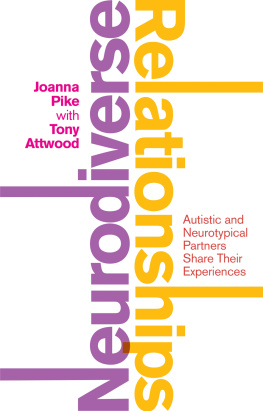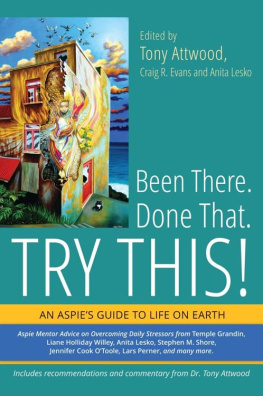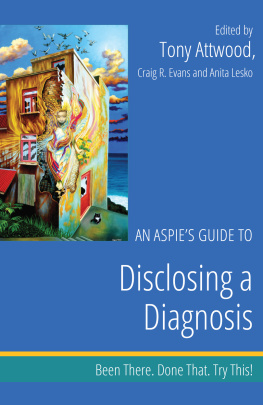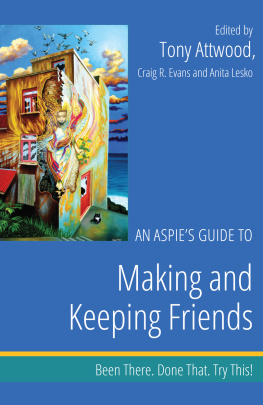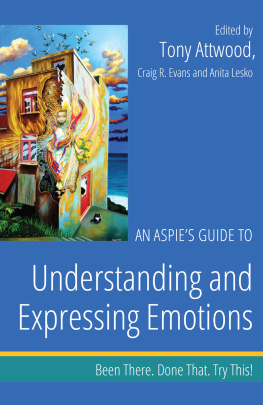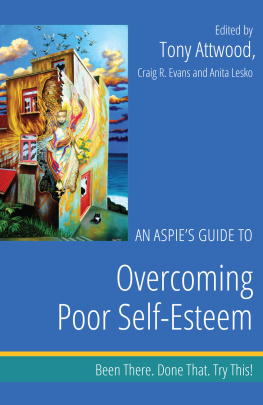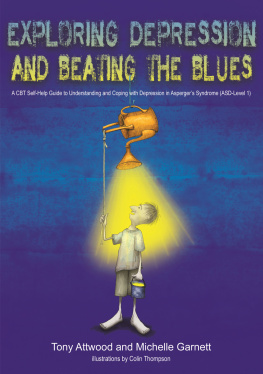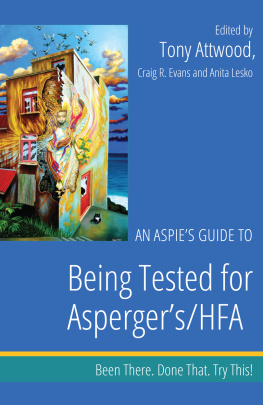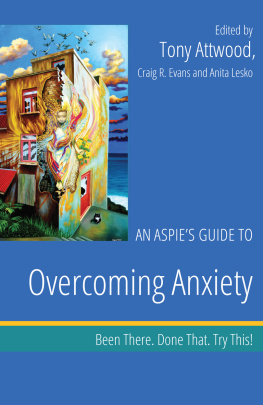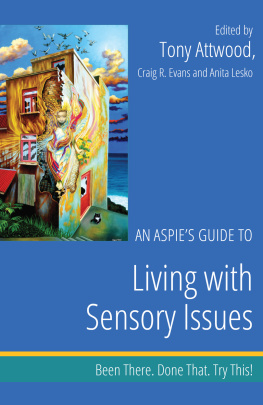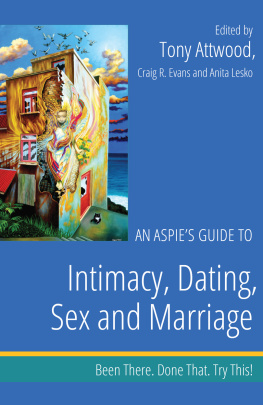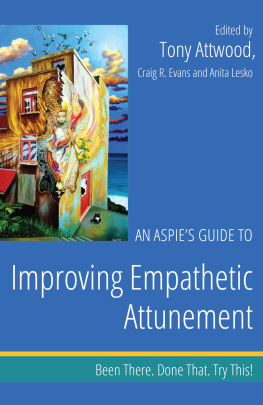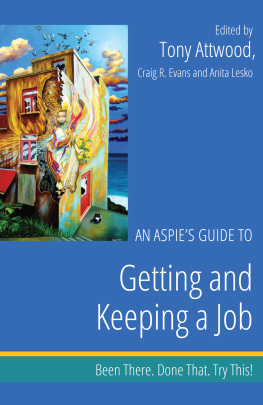
NEURODIVERSE RELATIONSHIPS
Autistic and Neurotypical Partners Share Their Experiences
JOANNA PIKE
with
DR TONY ATTWOOD
Foreword by Dr Tony Attwood

Jessica Kingsley Publishers
London and Philadelphia
Contents
Foreword
DR TONY ATTWOOD

This book will provide a unique insight into the minds of couples where one partner has a diagnosis of Aspergers syndrome. It is the first of its kind to provide perspectives from both sides on given topics in an attempt to help couples in neurodiverse relationships understand one another better. If you are in a relationship where one of you has Aspergers syndrome, this book will help change your relationship and your life for the better.
There are common themes that arise when a couple, or one of the couple, in an AS/NT relationship seeks counselling. This book covers twelve of the most frequently experienced problems, with each couple telling it how it is (from the AS perspective) and how it feels (from the NT perspective).
When you fall in love with an Aspie, the initial stages of the relationship can feel extraordinarily intense, and the attention lavished upon you hard to resist. Commonly, however, it is not long before there is a realization that the relationship is not what was originally anticipated. The initial intense feelings of love, compassion, tolerance and understanding are slowly eroded by experience. The NT partner identifies characteristics of the AS partner that have become irritating or depressing. Emotions, experiences and responsibilities are not shared; needs and expectations are not fulfilled; communication breakdowns occur; conflicts arise over priorities and increased anxiety can lead to control issues. The NT partner can experience a change in his or her own sense of identity as previously enjoyed experiences, such as social occasions, become less and less frequent, and feelings of isolation and loneliness within the relationship increase.
Often, the NT partner gradually and reluctantly starts to mirror the Aspie partners behaviour, lifestyle and thinking in order to maintain the relationship. The AS partner may also feel irritated and depressed, feeling unable to meet his or her partners expectations in terms of social experiences, expression of inner thoughts and feelings, intimacy, coping with change and household responsibilities from budgeting to taking care of children. Stress for the AS partner can be considerable due to not understanding criticism for contributing to a disappointing relationship and why his or her natural behaviour should cause such distress and anguish. The AS partner may not intuitively know what to do to rectify the relationship and may feel guilt, shame and a sense of failure.
While all couples experience some of the above challenges and can make adjustments to maintain the relationship, when one of the partners has the characteristics of AS, the degree of those challenges and adjustments is far greater and the strategies to repair or improve the relationship can seem elusive to both partners. Different Together has created Neurodiverse Relationships as an aid for both partners to better understand one anothers needs, expectations and perspectives.
This book has been written with each couple taking on a particular problem area within their relationship. We hope it will be of help to readers navigating what it means to be different together.
Glossary of Terms
AS Aspergers syndrome
ASC Autism Spectrum Condition
Aspie a term used to describe a person living with Aspergers syndrome, commonly used by those with AS to describe themselves
Aspergerese communicating in a way that people with AS will more easily understand
Love languages five distinct ways of showing and receiving love that will resonate at different levels for different people. These are: words of affirmation, acts of service, receiving gifts, quality time and physical touch
Neurodiverse relationship a relationship in which one partner is neurotypical and another is on the autistic spectrum or shows neurologically atypical behaviour
Neurotypical (NT) not displaying autistic or other neurologically atypical patterns of thought or behaviour
Traffic light system a system of using colours to identify feelings or emotions, such as red for angry, green for calm, etc. This same system can also be used with numbers or words that carry particular meanings
Introduction
Have you ever felt as though your life resembled that of the main character in the film Groundhog Day ? Are patterns of behaviour that lead to disagreements between you consistently being repeated despite your determination that things will change and be better next time? Have you or your partner breathed a huge sigh of relief when handed a diagnosis of Aspergers syndrome, believing that things can only get better only to find they dont? Me too.
My partners diagnosis of Aspergers syndrome was simply that a diagnosis. We left the office for the four-hour drive home without any further advice. There was no recommended reading, suggested support groups, a what to do now sheet or list of helpful organizations to contact. We talked on the way home about the different ways each of us had experienced relief at the diagnosis. For my partner it was, he said, finally understanding why hed felt as he had throughout his childhood, school and relationships, as though living behind frosted glass. His diagnosis gave me validation that I was not completely mad or the only one with a problem, as hed often accused me of being. But, beyond each other and the diagnosis, there was no ongoing support.
We hope this book will provide some helpful insights and support to those AS/NT couples struggling to understand one anothers perspective.
For many of the couples who contributed to this book anonymity was a necessary part of their commitment to participate. Ironically, the reason for anonymity is also, in part, what drove the need to write the book. There is still a stigma attached to the word autistic. For those so-called high-functioning autistic individuals (those with Aspergers syndrome) who often succeed in jobs ranging from law, finance, IT and engineering to education, music, art and design, it takes enormous courage and strength of character to risk a judgement that could potentially jeopardize their position at work. In time, our hope is that people become aware that frequently, many traits and behaviours that characterize Aspergers syndrome are the same traits and behaviours that enable those individuals to excel in their work lives.
A completely different set of traits and behaviours are required to form and maintain close personal relationships and it is those traits and behaviours that are a challenge to individuals with AS. We hope that this book becomes a useful resource within those neurodiverse relationships.
Neurodiverse Relationships is a collection of writing from different people, some AS and some NT, each with a different style of writing. We are presenting the chapters as theyve been written, in the authors unique voice. Although we have tried to make the format flow as much as possible, we felt it important to give continuation without diminishing the originality and authenticity of each of the contributors. To make the chapters completely uniform in style would defeat the purpose of the book to give real voices an opportunity to speak. This book is about partnerships and the trials, the triumphs, different personalities, different topics and different approaches within them.
Next page
